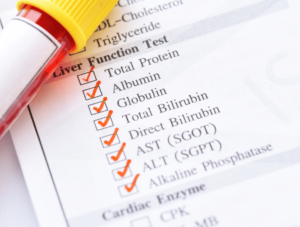Imagine if we all had a window into our health – a way to understand our body’s needs, catch early warning signs, and make informed decisions long before symptoms appear. Blood tests are exactly that window, offering us critical insights that are so often overlooked in routine checkups. A lot of guys feel that blood testing seems unnecessary without obvious symptoms, but regular blood work can reveal the subtle beginnings of issues like cardiovascular disease, hormonal imbalances, or nutrient deficiencies that are the root of so many people’s loss of health and vitality.
This article sheds light on why regular blood testing is so much more than just a medical formality or something to do in emergencies; it’s a seriously empowering and increasingly accessible tool that enables men to stay ahead of potential health risks, optimize wellness, and take control of their lives at every age.
Common Health Risks That Blood Tests Can Detect
Heart Health
Heart disease is the leading cause of death for men globally, and it often develops over decades without noticeable symptoms. Blood tests that measure cholesterol, triglycerides, and C-reactive protein (CRP) offer crucial insights into cardiovascular health. High levels of LDL cholesterol, for example, are linked to an increased risk of heart disease. CRP, an inflammation marker, has been associated with heart disease risk, as inflammation can destabilize plaque in arteries, increasing the likelihood of a heart attack or stroke. Monitoring these markers enables men to make changes early on, potentially saving years of life.
triglycerides, and C-reactive protein (CRP) offer crucial insights into cardiovascular health. High levels of LDL cholesterol, for example, are linked to an increased risk of heart disease. CRP, an inflammation marker, has been associated with heart disease risk, as inflammation can destabilize plaque in arteries, increasing the likelihood of a heart attack or stroke. Monitoring these markers enables men to make changes early on, potentially saving years of life.
Hormonal Health
Hormonal health is foundational for men’s energy, mood, and physical fitness. Testosterone and thyroid hormone levels directly influence everything from muscle mass to metabolism. Declines in testosterone are a natural part of aging, but for some men, levels may drop earlier than expected, leading to fatigue, weight gain, and even depression. Thyroid dysfunction is another common issue, with low thyroid hormone levels (hypothyroidism) often causing weight gain and low energy. Blood tests that check testosterone and thyroid hormones (TSH, T3, T4) can provide clarity on these symptoms, enabling men to address imbalances and improve their overall well-being.
Metabolic Health
Metabolic health is a growing concern as more men face insulin resistance and prediabetes. Blood sugar tests, particularly HbA1c, which provides an average blood glucose level over the past three months, are essential for detecting early signs of diabetes. Elevated blood glucose and insulin levels can quietly damage blood vessels and organs, increasing the risk of heart disease, nerve damage, and kidney problems. Early detection allows men to adjust their diet and exercise habits to prevent diabetes, ultimately lowering their risk of these complications.
Liver and Kidney Function
The liver and kidneys play critical roles in detoxification and maintaining homeostasis. Blood tests measuring liver enzymes (ALT, AST) and kidney function markers (creatinine, BUN) can reveal underlying issues that may otherwise go unnoticed. For instance, elevated liver enzymes may indicate fatty liver disease, which has become increasingly common due to high sugar and alcohol consumption. Monitoring these markers enables men to make lifestyle changes or seek treatment before issues become severe.
The Benefits of Routine Blood Tests
Early Detection and Prevention
Regular blood tests help identify health issues at their earliest stages. Without routine testing, many conditions – like hypertension, diabetes, or vitamin deficiencies – can progress without clear symptoms, becoming harder to treat. Early detection through blood tests can lead to interventions that slow or even reverse disease progression, drastically improving quality of life.
Baseline Establishment
Each person has unique health markers, which makes having a personal baseline invaluable. By tracking levels like blood glucose, cholesterol, or testosterone over time, men can detect shifts that may indicate early signs of health changes, even if those levels are within the general “normal” range. Establishing a baseline helps personalize care and enables doctors to interpret results more accurately.
Personalized Health Interventions
Men often receive general health advice, but blood test results can make those recommendations specific. For example, if blood tests reveal low vitamin D or magnesium, men can adjust their diet or add supplements to fill these gaps, resulting in a more targeted health strategy. This personalized approach increases the effectiveness of lifestyle interventions and can prevent the onset of future health issues.
Mental Health Links
Blood tests can identify deficiencies that affect mental health. Low levels of vitamin D, iron, or B vitamins are associated with fatigue, mood swings, and cognitive impairment. Low testosterone can also lead to depression or reduced motivation. By understanding nutrient and hormone levels, men can make necessary adjustments that positively impact their mental health and cognitive function, fostering resilience and a better quality of life.
Recommended Blood Tests for Men
- Essential Blood Panels: At a minimum, men should consider a Complete Blood Count (CBC), lipid panel, and basic metabolic panel during annual or biannual checkups. The CBC can detect anemia, infections, and blood disorders, while the lipid panel monitors cholesterol levels. The metabolic panel assesses kidney and liver function, blood glucose, and electrolyte balance, providing a comprehensive view of general health.
- Hormone Testing: Testing for testosterone, estradiol, and thyroid hormones (TSH, T3, T4) provides insight into hormonal balance and can help address symptoms like fatigue, low libido, or mood changes.
- Vitamin and Mineral Levels: Essential nutrients like vitamin D, B12, magnesium, and zinc play significant roles in energy, immunity, and mood regulation. Testing these levels ensures men can optimize their nutrient intake, especially for those with dietary restrictions or limited sun exposure.
- Lipoprotein(a) and Apolipoprotein B (APOB) Tests: The importance of Lipoprotein(a) and Apolipoprotein B (APOB) testing is increasingly recognized as these tests offer a more nuanced look at cardiovascular risk. While standard lipid panels measure general cholesterol levels, Lipoprotein(a) is a specific particle that can contribute to plaque buildup in arteries, elevating heart disease risk independently of LDL cholesterol.
- Similarly, APOB represents the number of atherogenic particles (particles that contribute to arterial plaque), providing a more precise marker for cardiovascular risk than LDL levels alone. These tests are particularly useful for those with a family history of heart disease, as they offer deeper insights into potential hereditary risks and can guide more targeted lifestyle and treatment interventions.
- Inflammation Markers: CRP and homocysteine are markers of inflammation. Elevated levels may signal a higher risk of chronic conditions, allowing men to focus on anti-inflammatory strategies to mitigate risks.
Overcoming the Common Barriers to Blood Testing
- “If It Ain’t Broke, Don’t Fix It” Mindset: Many men only consider blood tests when they feel unwell, but a proactive approach can prevent future issues. Recognizing the value of blood tests as an essential tool in health management is key to overcoming this mindset.
- Cost and Accessibility: In recent years, access to blood testing has greatly improved thanks to telehealth services and innovative healthcare companies that bring affordable options to more people. Companies now offer at-home testing kits, where individuals can collect samples themselves and mail them for lab analysis, often receiving results digitally within days. Telehealth clinics also make it easier to consult with healthcare providers who can recommend and interpret these tests without the need for in-person visits. This shift toward accessible, convenient options is helping more men prioritize regular blood testing, making proactive health monitoring a reality for all budgets and lifestyles.
- Privacy Concerns: Some men worry about sharing personal health information. To address this, it’s essential to research providers that prioritize data privacy and explain how personal health data is protected. Many at-home test providers also offer secure options to manage data confidentiality.

How Often Should Guys Get Blood Tests?
- General Guidelines by Age Group: Testing frequency should increase with age. In their 20s, men may only need annual tests to establish a baseline. However, by their 30s and 40s, men should consider biannual or even quarterly tests if they have family histories of heart disease, diabetes, or other conditions. Regular testing becomes increasingly important for men in their 50s and beyond to monitor age-related health changes.
- Factors That Increase Frequency Needs: Lifestyle and genetics play a role in how often men should test. Men with a family history of conditions like hypertension or diabetes, or those leading high-stress or sedentary lifestyles, may need more frequent monitoring to catch early signs of potential health issues.
Closing Thoughts
Regular blood testing is one of the most powerful tools men have in today’s age to take control of their health. Rather than waiting for symptoms to appear, blood tests allow for early detection, baseline establishment, and targeted health interventions that can prevent or delay the onset of disease. By consulting with healthcare providers and creating a customized testing schedule, guys can make way more informed lifestyle choices and proactively protect their health.
informed lifestyle choices and proactively protect their health.
For men ready to really prioritize their health, scheduling a blood test is a foundational first step they can take. Reach out to a healthcare provider, or explore at-home test kits to begin tracking your health markers today. Even one small step, like checking your cholesterol or vitamin D levels, can mark the start of a much healthier and, potentially, much longer life.









